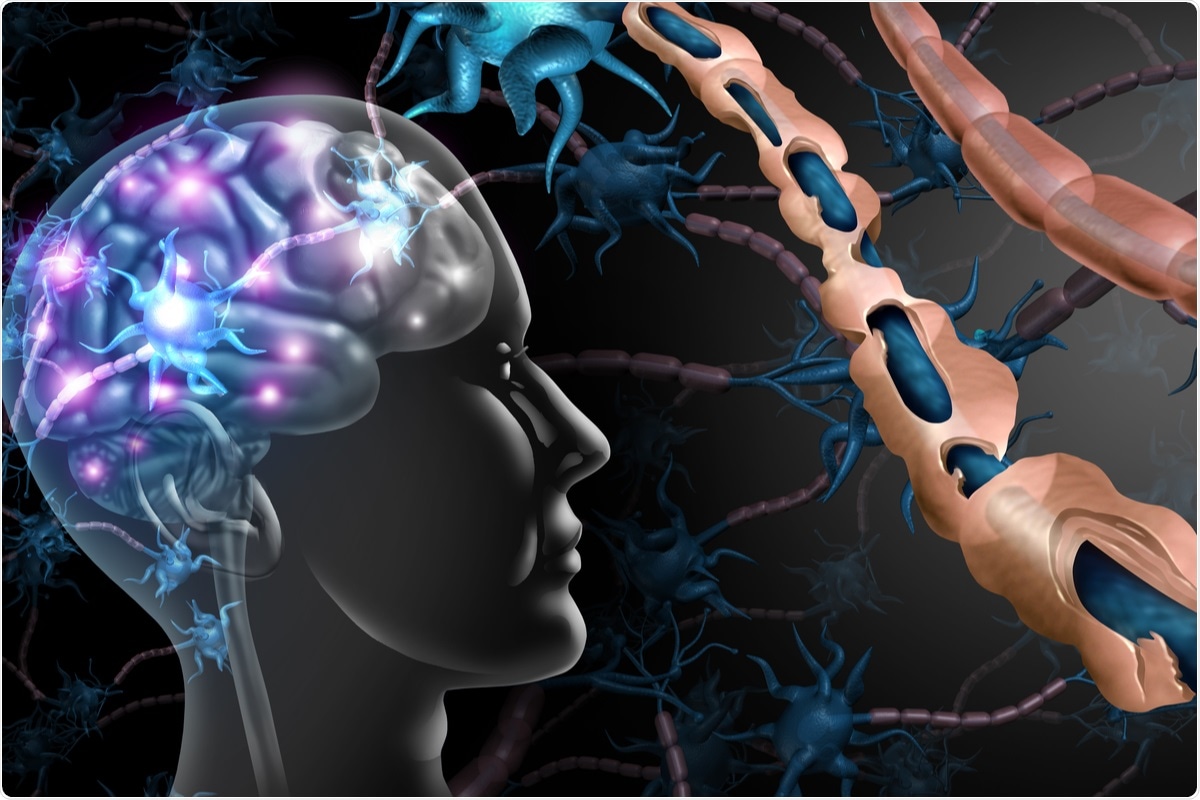Multiple Sclerosis (MS) patients may receive various treatments that are thought to interfere with coronavirus disease 2019 (COVID-19) disease progression and the efficacy of the COVID-19 vaccines. Early reports have suggested that patients receiving specific monoclonal antibody and receptor modulator treatments for MS are at greater risk of hospitalization and death from COVID-19.
 Study: Impact of multiple sclerosis disease-modifying therapies on SARS-CoV-2 vaccine-induced antibody and T cell immunity. Image Credit: Lightspring/ Shutterstock
Study: Impact of multiple sclerosis disease-modifying therapies on SARS-CoV-2 vaccine-induced antibody and T cell immunity. Image Credit: Lightspring/ Shutterstock
Several studies have demonstrated reduced antibody titers against the severe acute respiratory syndrome coronavirus 2 (SARS-CoV-2) spike protein in these individuals following vaccine administration. In a paper recently uploaded to the preprint server medRxiv *, the vaccine-induced cellular and immune response of MS patients receiving a range of therapies are assessed with special regard to spike-specific IgG CD4+ and CD8+ T-cell responses.
A preprint version of the study is available on the medRxiv* server while the article undergoes peer review.
How was the study performed?
67 MS patients receiving either no treatment, or one of glatiramer acetate (GA), dimethyl fumarate (DMF), natalizumab (NTZ), S1P receptor modulators, or anti-CD20 mAb (rituximab (RTX) or ocrelizumab (OCR)) therapies were recruited for the study, in addition to 13 individuals as healthy controls.
All participants had received both doses of any approved vaccine, and blood samples were collected from participants before and 2-4 weeks after vaccination, depending on the type of vaccine received.
Total SARS-CoV-2 spike IgG was found to be significantly elevated by similar magnitudes in almost all groups following vaccination, with patients receiving S1P, RTX, or OCR demonstrating reduced antibody responses, undetectable in some cases. While exhibiting similar levels of spike-specific antibodies to patients receiving other drugs, patients receiving DMF or NTZ exhibited higher levels of receptor-binding domain (RBD) specific antibodies.
In contrast, patients receiving S1P, RTX, or OCR also had significantly reduced RBD-specific antibody titers. Regarding IgG seropositivity, only RTX caused a significant drop in total spike IgG, while S1P, RTX, and OCR patients had significant reductions in total RBD IgG seropositivity.
S1P receptor modulators are known to influence CD4+ levels, and as expected, this group showed reduced CD4+ T-cell percentages both before and after vaccination compared to the no-treatment group. All other MS patients showed comparable CD4+ levels to those observed in the untreated. Patients receiving S1P receptor modulators, RTX, or OCR therapies exhibited reduced CD19+ B cell percentages before and after vaccination.
CD4+ cells from all groups produced similar percentages of cytokines such as interferon-γ (IFNγ), tumor necrosis factor-α (TNFα), and interleukin-2 (IL-2). However, frequencies of IL-4 and IL-10 secreting cells were unchanged post-vaccination in any MS treatment group. Spike-specific CD8+ T-cells were increased post-vaccination in all patients but those receiving GA, and again, IL-2, IFNγ, and TNFα levels were produced by CD8+ cells to high levels with minimal IL-4 and IL-10.
Monoclonal antibody treatment reduces vaccine efficacy
Having observed vaccine inefficacy in those receiving the anti-CD20 mAb therapies RTX and OCR, the group employed a univariate analysis of antibody responses against several metrics, finding no association with gender, mRNA vaccine type, or last measured IgG levels compared to post-vaccination levels.
Pre- and post-vaccination percentages of CD4+ and CD8+ T-cells were also found to have no association with human leukocyte antigen levels, which is the major risk factor for multiple sclerosis. However, these patients did see an increase in CD19+ B-cells, spike/RBD IgG, and spike/RBD seropositive patients post-vaccination.
Some prior reports have indicated that the variability in the timing of anti-CD20 mAb doses and vaccines could influence their efficacy. However, the group reported no correlation between infusion-vaccination interval and total spike/RBD IgG levels.
However, the time from the start of anti-CD20 mAb therapy to the time of vaccination (cumulative treatment duration) was found to influence seropositivity. The two patients treated for over 40 months were seronegative, and the two treated for less than 35 being seropositive.
The patients treated for a shorter duration had also specifically received the anti-CD20 mAb drug OCR. In comparison, those treated for a longer duration had received RTX, likely explaining the more detrimental effect observed from the latter regarding seropositivity.
Conclusion
In conclusion, S1P receptor modulators and anti-CD20 mAb therapies were found to significantly reduce total spike and RBD IgG generated by vaccination compared to untreated MS patients or healthy controls.
CD19+ cell percentage following vaccination was found to correlate strongly with spike seropositivity, suggesting that B-cell reconstitution in lymphoid tissue and subsequent circulation is responsible for antibody generation. This may explain seropositivity among anti-CD20 mAb patients with shorter treatment times, where B-cell reserves in lymphoid tissue are eventually depleted, ultimately resulting in a seronegative response.
MS treatment did not alter CD4+ or CD8+ cytokine output, though treatment with RTX resulted in increased CD8+ T-cell production and subsequent IFNγ secretion.
Despite the partial protection conferred by vaccination via cell-mediated immunity, most MS patients receiving these therapies remain highly vulnerable immunocompromised patients. Thus, they are at higher risk of infection, hospitalization, and death from COVID-19.
In particular, prolonged anti-CD20 mAb therapies have been demonstrated to eliminate the benefit of vaccination in many cases, meaning that individuals receiving these drugs will need to act and be treated with extreme caution regarding disease control for the foreseeable future.
*Important notice
medRxiv publishes preliminary scientific reports that are not peer-reviewed and, therefore, should not be regarded as conclusive, guide clinical practice/health-related behavior, or treated as established information.
- Sabatino, J. et al. (2021) "Impact of multiple sclerosis disease-modifying therapies on SARS-CoV-2 vaccine-induced antibody and T cell immunity". medRxiv. doi: 10.1101/2021.09.10.21262933.
Posted in: Medical Science News | Medical Research News | Disease/Infection News
Tags: Antibodies, Antibody, Antigen, B Cell, Blood, CD4, Cell, Cell Production, Coronavirus, Coronavirus Disease COVID-19, Cytokine, Cytokines, Drugs, Efficacy, Human Leukocyte Antigen, Immune Response, immunity, Interferon, Interleukin, Interleukin-2, Leukocyte, Monoclonal Antibody, Multiple Sclerosis, Necrosis, Protein, Receptor, Rituximab, SARS, SARS-CoV-2, Sclerosis, Spike Protein, T-Cell, TNFα, Tumor, Tumor Necrosis Factor, Vaccine

Written by
Michael Greenwood
Michael graduated from Manchester Metropolitan University with a B.Sc. in Chemistry in 2014, where he majored in organic, inorganic, physical and analytical chemistry. He is currently completing a Ph.D. on the design and production of gold nanoparticles able to act as multimodal anticancer agents, being both drug delivery platforms and radiation dose enhancers.
Source: Read Full Article



